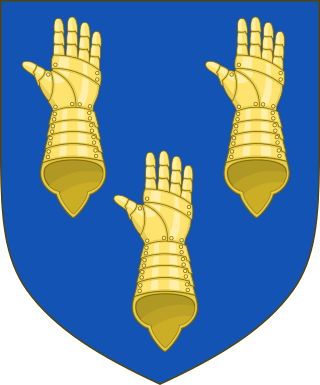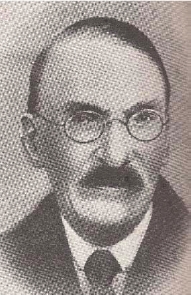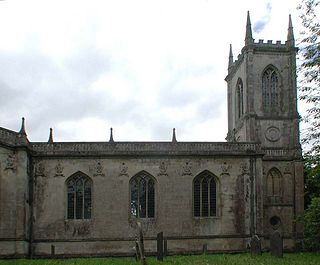Arms
  |
|
Baron Gretton, of Stapleford in the County of Leicester, [1] is a title in the Peerage of the United Kingdom. It was created in 1944 for the brewer and Conservative politician John Gretton. He was head of the brewery firm of Bass, Ratcliff & Gretton Ltd of Burton upon Trent and also represented Derbyshire South, Rutland and Burton in Parliament. His son, the second Baron, also represented Burton in the House of Commons as a Conservative. As of 2017 [update] the title is held by the latter's grandson, the fourth Baron, who succeeded his father in 1989. His mother, Jennifer Gretton, Lady Gretton, was Lord Lieutenant of Leicestershire between 2003 and 2018.
The family seat is Somerby House, near Somerby, Melton Mowbray, Leicestershire. The former family seat was Stapleford Park, also in Leicestershire.
The heir apparent is the present holder's son the Hon. John Frederick Bruce Gretton. (b. 2008)
  |
|

Baron Inglewood, of Hutton in the Forest in the County of Cumberland, is a title in the Peerage of the United Kingdom.

Earl of Verulam is a title in the Peerage of the United Kingdom. It was created in 1815 for James Grimston, 4th Viscount Grimston. He was made Viscount Grimston at the same time. Verulam had previously represented St Albans in the House of Commons. In 1808 he had also succeeded his maternal cousin as tenth Lord Forrester. He was succeeded by his son, the second Earl.

Earl Howe is a title that has been created twice in British history, for members of the Howe and Curzon-Howe family respectively. The first creation, in the Peerage of Great Britain, was in 1788 for Richard Howe, 4th Viscount Howe, but it became extinct upon his death in 1799. The second creation, in the Peerage of the United Kingdom, was in 1821 for Richard Curzon-Howe, 2nd Viscount Curzon, and it remains extant.

Baron Hesketh, of Hesketh in the County Palatine of Lancaster, is a title in the Peerage of the United Kingdom. It was created in 1935 for Sir Thomas Fermor-Hesketh, 8th Baronet, who had previously briefly represented Enfield in the House of Commons as a Conservative. As of 2010 the titles are held by his grandson, the third Baron, who succeeded his father in 1955. Lord Hesketh held junior ministerial positions in the Conservative administrations of Margaret Thatcher and John Major. However, he lost his seat in the House of Lords after the House of Lords Act 1999 removed the automatic right of hereditary peers to sit in the upper chamber of Parliament.

Baron Hazlerigg, of Noseley in the County of Leicester, is a title in the Peerage of the United Kingdom. It was created in 1945 for Sir Arthur Hazlerigg, 13th Baronet. He had previously served as Lord Lieutenant of Leicestershire. As of 2023 the title is held by his great-grandson, the fourth Baron, who succeeded his father in 2022.

Baron Glentoran, of Ballyalloly in the County of Down, is a title in the Peerage of the United Kingdom. It was created on 8 July 1939 for the Unionist politician Herbert Dixon. In 1950 he also succeeded his elder brother as third Baronet, of Ballymenock. His son, the second Baron, was also a politician and served as the last Speaker of the Senate of Northern Ireland. As of 2017 the titles are held by the latter's son, the third Baron, who succeeded in 1995. He is a former Olympic bobsleigh gold medallist as well as a soldier, businessman and politician. Lord Glentoran was one of the ninety elected hereditary peers who remain in the House of Lords after the passing of the House of Lords Act 1999, and sat on the Conservative benches until his June 2018 retirement under the House of Lords Reform Act 2014.
Baron de Ramsey, of Ramsey Abbey in the County of Huntingdon, is a title in the Peerage of the United Kingdom. It was created in 1887 for Edward Fellowes, who had previously represented Huntingdonshire in the House of Commons as a Conservative for 43 years. His eldest son, the second Baron, sat as Member of Parliament for Huntingdonshire and Ramsey and later served as a Lord-in-waiting from 1890 to 1892 in the Conservative administration of Lord Salisbury. His grandson, the third Baron, was Lord Lieutenant of Huntingdonshire from 1947 to 1965 and of Huntingdon and Peterborough between 1965 and 1968. As of 2017 the title is held by the latter's son, the fourth Baron, who succeeded in 1993.

Baron Newton, of Newton-in-Makerfield in the County Palatine of Lancaster, is a title in the Peerage of the United Kingdom. It was created in 1892 for the Conservative politician William Legh, who had earlier represented Lancashire South and Cheshire East in the House of Commons.

Baron Burton, of Burton-on-Trent and of Rangemore in the County of Stafford, is a title in the Peerage of the United Kingdom. It was created in 1897 for the prominent brewer, philanthropist and Liberal politician Michael Bass, 1st Baron Burton. He had already been created a baronet in 1882 and Baron Burton in 1886. However, the three titles had different remainders. The Bass family descended from William Bass, who founded the brewery business of Bass & Co in Burton upon Trent in 1777. His grandson Michael Thomas Bass transformed the company into one of the largest breweries in the United Kingdom. He also represented Derby in Parliament as a Liberal for thirty-five years and was a great benefactor to the town of Burton. However, Bass declined every honour offered to him, including a baronetcy and a peerage.
Baron Rotherwick, of Tylney in the County of Southampton, is a title in the Peerage of the United Kingdom.
Baron Aldenham, of Aldenham in the county of Hertfordshire, is a title in the Peerage of the United Kingdom that was created on 31 January 1896 for the businessman Hucks Gibbs. He was head of the family firm of Antony Gibbs & Sons and a director and Governor of the Bank of England. Gibbs also briefly sat as a Conservative Member of Parliament for the City of London. His fourth son Herbert Cokayne Gibbs was created Baron Hunsdon of Hunsdon in 1923.
Jennifer Ann Gretton, Baroness Gretton, is a former Lord Lieutenant of Leicestershire, serving for over 15 years between 2003 and 2018.

John Gretton, 1st Baron Gretton, was a British businessman and Conservative politician. Gretton won two gold medals in the 1900 Olympic Games. He served as a Member of Parliament (MP) for 46 years, representing three constituencies in that period.
John Frederic Gretton, 2nd Baron Gretton OBE, was a British peer and Conservative Member of Parliament.

Stapleford Park is a Grade I listed country house in Stapleford, near Melton Mowbray in Leicestershire, England, which is now used as a hotel. It was originally the seat of the Sherard and Tamblyn families, later the Earls of Harborough and, from 1894, of the Gretton family, who would become the Barons Gretton.

St Mary Magdalene's Church is a redundant Anglican church near the village of Stapleford, Leicestershire, England. It is recorded in the National Heritage List for England as a designated Grade I listed building, and is under the care of the Churches Conservation Trust. It is situated in the grounds of Stapleford Park.

John Henrik Gretton, 3rd Baron Gretton DL was an English peer, owner of Stapleford Park in Leicestershire.
John Lysander Gretton, 4th Baron Gretton, is an English peer, landowner and farmer.
Baron Dunleath, of Ballywalter in the County of Down, is a title in the Peerage of the United Kingdom. It was created on 29 August 1892 for the businessman and former Conservative Member of Parliament for Downpatrick, John Mulholland. The Mulholland family were involved in the cotton and linen industry in Ulster in the north of Ireland. The first Baron's son, the second Baron, represented Londonderry North in the House of Commons as a Conservative. His grandson, the fourth Baron, was a member of the Northern Ireland Assembly for the Alliance Party. He was succeeded by his first cousin, the fifth Baron, who had already succeeded his father as second Baronet of Ballyscullion. As of 2017 the titles are held by the fifth Baron's son, the sixth Baron, who succeeded in 1997.
Robert Sherard, 6th Earl of Harborough, styled Lord Sherard from 1797 to 1799, was a British peer.